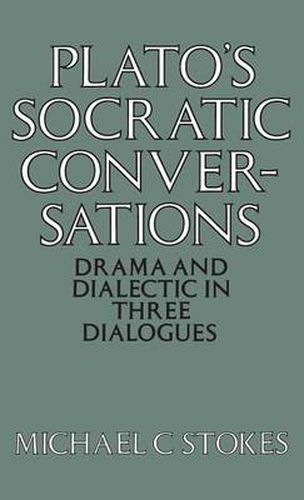Readings Newsletter
Become a Readings Member to make your shopping experience even easier.
Sign in or sign up for free!
You’re not far away from qualifying for FREE standard shipping within Australia
You’ve qualified for FREE standard shipping within Australia
The cart is loading…






This study focuses on Laches, Protagoras, and the conversation between Socrates and Agathon in the Symposium. For these dialogues the author proposes a strategy of interpretation that insists on the dialogues’ essentially interrogatory character… . Stokes argues that we are not entitled to ascribea thesis to Socrates (far less to Plato) unless he unambiguously asserts it as his own belief… . For the most part, Stokes argues, Socrates is doing what he claims to be doing: cross-examining his interlocutor. He draws the materials of his own argument from the respondent’s explicit admissions and from his own knowledge of the respondent’s character, commitments and ways of life.What is shown by such a procedure is not, … [according to Stokes], that acertain thesis is true or false, but, rather, that a certain sort of person, with certain commitments, can be led, on pain of inconsistency, to assent to theses that at first seem alien to him. Sometimes, as it turns out, these are theses that Socrates also endorses in his own person. Times Literary Supplement
$9.00 standard shipping within Australia
FREE standard shipping within Australia for orders over $100.00
Express & International shipping calculated at checkout
This study focuses on Laches, Protagoras, and the conversation between Socrates and Agathon in the Symposium. For these dialogues the author proposes a strategy of interpretation that insists on the dialogues’ essentially interrogatory character… . Stokes argues that we are not entitled to ascribea thesis to Socrates (far less to Plato) unless he unambiguously asserts it as his own belief… . For the most part, Stokes argues, Socrates is doing what he claims to be doing: cross-examining his interlocutor. He draws the materials of his own argument from the respondent’s explicit admissions and from his own knowledge of the respondent’s character, commitments and ways of life.What is shown by such a procedure is not, … [according to Stokes], that acertain thesis is true or false, but, rather, that a certain sort of person, with certain commitments, can be led, on pain of inconsistency, to assent to theses that at first seem alien to him. Sometimes, as it turns out, these are theses that Socrates also endorses in his own person. Times Literary Supplement